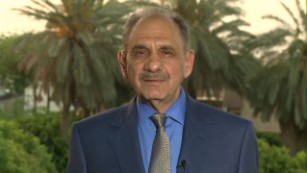I must have been sleeping under a rock... only saw this news now.
Iraqi army conduct in Ramadi 'surprised all of us,' deputy prime minister says
By Mick Krever, CNN
Updated 2237 GMT (0537 HKT) May 25, 2015
(CNN)The Iraqi army's willingness to let Ramadi fall to
"surprised all of us," Deputy Prime Minister Saleh al-Mutlaq told CNN on Monday.
"It's not clear for us why such a unit, which was supposed to be trained by the Americans for years, and supposed to be one of the best units in the army, would withdraw from Ramadi in such a way."
"This is not the army that we are willing to see or we are expecting to see."
Al-Mutlaq, a Sunni who leads his own party and often criticizes Prime Minister Haider al-Abadi, spoke with CNN's Frederik Pleitgen on "Amanpour," a day after scathing criticism of the Iraqi military by U.S. Defense Secretary Ash Carter.
"They were not outnumbered,"
in an exclusive interview. "In fact, they vastly outnumbered the opposing force. And yet they failed to fight; they withdrew from the site."
"And that says to me, and I think to most of us, that we have an issue with the will of the Iraqis."
Al-Abadi told the BBC on Monday that Carter was "fed with the wrong information."
Al-Mutlaq, however, seemed to echo the American defense secretary in arguing that Iraqis do not have hope for their country.
"If they don't see the future for them in
, I don't think they will fight Daesh, ISIS, in the way we want them. There will be some fighting, but we want real determination, a real effort, as we saw in 2007, 2008, when they fought because they thought they can have a future."
Al-Mutlaq was referring to the Sunni Awakening, in which Sunni Iraqis, backed by the United States, rose up against al Qaeda. It was a movement that began in Anbar province, of which Ramadi is the capital.
"The Sunni people, they are not with ISIS, this is for sure."
But "they are not certain now if they could fight ISIS, and if they fight ISIS, what is after ISIS? Actually, there is a worry among people -- and among us -- about what is going to happen after ISIS.
"What is after that? Are they going to live in an area which is going to rebuild again? Is there going to be a reconciliation? Are they going to be included in the government? Is there going to be an inclusive government? Is there going to be a real reconciliation in the country? These are our question marks. Without answering them, it will be very difficult to see the end of ISIS in a short time."
There was hope among Iraq's Sunnis, al-Mutlaq said, that al-Abadi would be a more inclusive leader than his predecessor,
, who has been widely blamed for creating a deeply sectarian atmosphere both within government and the country at large.
"The people, they are losing hope that a real government (can) run Iraq in a way that every Iraqi will see himself contributing.
"Although we feel that the intention of Mr. Abadi is good, is OK, but what we see on the ground until now is not enough to convince us that things are going to be working in a proper way."
For example, he said, though he is a member of al-Abadi's government, Sunnis are still being sidelined from the security apparatus.
"Without having a political solution to the problems in Iraq, without having a reconciliation in the country, the military side of the battle cannot work alone," he said.
That reconciliation, long sought, still appears to be elusive.
The United States, which has limited itself to airstrikes and military advisers in Iraq, in addition to its support of the Iraqi government, has come under renewed pressure since the fall of Ramadi to do more to help fight ISIS.
Like many analyzing how Iraq has gotten to this point, al-Mutlaq pointed at least in part to the American decision to disband the Iraqi military after its 2003 invasion, and send droves of suddenly disaffected -- and military-trained -- Sunnis into the streets.
"First you should not dissolve the Iraqi army, and the Americans did dissolve the Iraqi army.
"And then, we said since you have already decided to dissolve the Iraqi army, now you have to build a national army, which is not sectarian, which is a professional army.
"But unfortunately, the army was built in a way that the militias was entered in it, and also it was not built on a national basis, but on a sectarian one," he said.
"Unfortunately, the withdrawal was not in a responsible way. So the occupation was wrong, and the withdrawal was wrong also. Both of them are wrong steps, which led to what we are now. Now we have to act immediately."
Khedery: 6,000 Iraqi forces fell to 150 ISIS fighters
Wow, 6000 vs 150 with americans backing them with close air support from above and they still lost. This makes the ISIS fighters look like the modern day
SPARTANS!

Maybe the ISIS has this guy as their commander. Who really knows at this point.
At this rate I think all of middle east might fell to ISIS in 10 years time! Which will be quite ironic for the american since they invaded Iraq under the pretense that Saddam was supporting Al Quada. Now Iraq, Syria and maybe even all of middle east might fell to ISIS and morph into this terrorist super state!


